Portfolio of Work: Analytical Skills & Development Theories
VerifiedAdded on 2023/06/12
|9
|2695
|122
Portfolio
AI Summary
This portfolio delves into various aspects of professional and career development. It begins with an introduction to the concept of professional and career development, emphasizing the importance of continuous learning and skill enhancement. The portfolio includes a SWOT analysis to evaluate personal strengths, weaknesses, opportunities, and threats, followed by a personal development plan outlining actions to improve communication, leadership, and decision-making skills. It explores learning and development theories such as behaviorism, humanism, and cognitive theory, explaining their application in organizational training and employee development. Furthermore, the portfolio presents a reflection on the learning process using Gibb's Reflective Cycle, specifically focusing on the concept of open book assessment, detailing the individual's description, feelings, evaluation, analysis, and conclusion regarding this learning experience. The portfolio demonstrates a comprehensive understanding of professional development principles and their practical application.

Portfolio of work
Paraphrase This Document
Need a fresh take? Get an instant paraphrase of this document with our AI Paraphraser
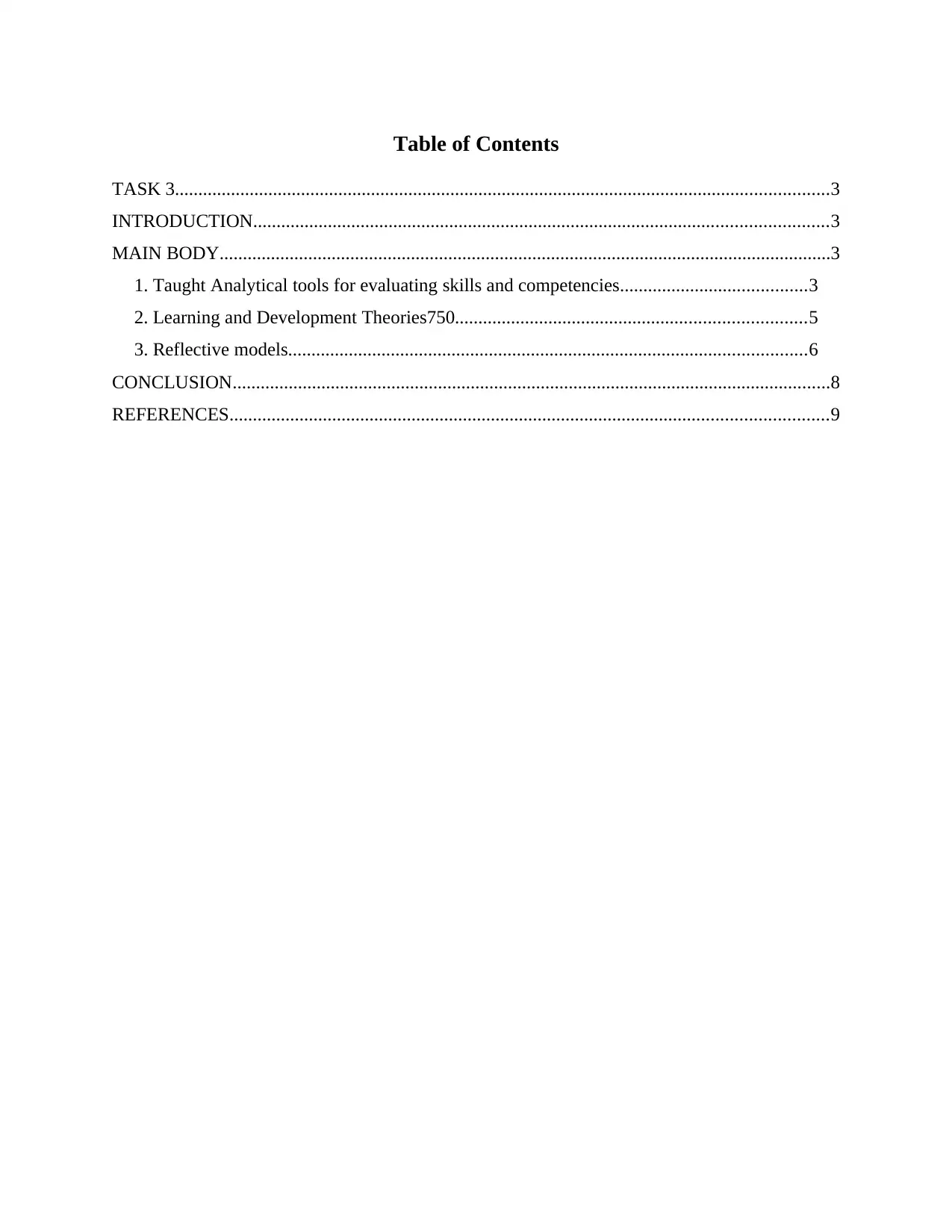
Table of Contents
TASK 3............................................................................................................................................3
INTRODUCTION...........................................................................................................................3
MAIN BODY...................................................................................................................................3
1. Taught Analytical tools for evaluating skills and competencies........................................3
2. Learning and Development Theories750...........................................................................5
3. Reflective models...............................................................................................................6
CONCLUSION................................................................................................................................8
REFERENCES................................................................................................................................9
TASK 3............................................................................................................................................3
INTRODUCTION...........................................................................................................................3
MAIN BODY...................................................................................................................................3
1. Taught Analytical tools for evaluating skills and competencies........................................3
2. Learning and Development Theories750...........................................................................5
3. Reflective models...............................................................................................................6
CONCLUSION................................................................................................................................8
REFERENCES................................................................................................................................9
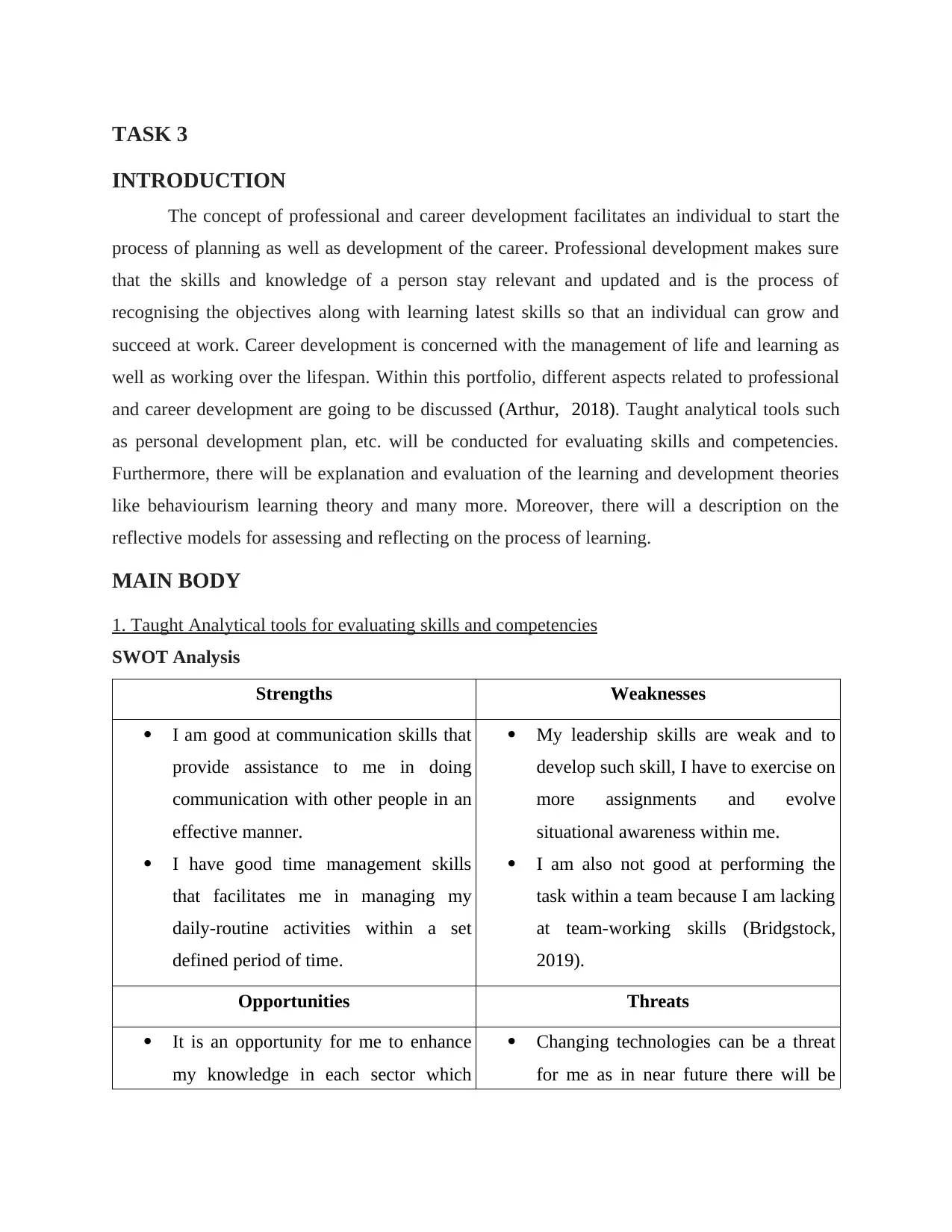
TASK 3
INTRODUCTION
The concept of professional and career development facilitates an individual to start the
process of planning as well as development of the career. Professional development makes sure
that the skills and knowledge of a person stay relevant and updated and is the process of
recognising the objectives along with learning latest skills so that an individual can grow and
succeed at work. Career development is concerned with the management of life and learning as
well as working over the lifespan. Within this portfolio, different aspects related to professional
and career development are going to be discussed (Arthur, 2018). Taught analytical tools such
as personal development plan, etc. will be conducted for evaluating skills and competencies.
Furthermore, there will be explanation and evaluation of the learning and development theories
like behaviourism learning theory and many more. Moreover, there will a description on the
reflective models for assessing and reflecting on the process of learning.
MAIN BODY
1. Taught Analytical tools for evaluating skills and competencies
SWOT Analysis
Strengths Weaknesses
I am good at communication skills that
provide assistance to me in doing
communication with other people in an
effective manner.
I have good time management skills
that facilitates me in managing my
daily-routine activities within a set
defined period of time.
My leadership skills are weak and to
develop such skill, I have to exercise on
more assignments and evolve
situational awareness within me.
I am also not good at performing the
task within a team because I am lacking
at team-working skills (Bridgstock,
2019).
Opportunities Threats
It is an opportunity for me to enhance
my knowledge in each sector which
Changing technologies can be a threat
for me as in near future there will be
INTRODUCTION
The concept of professional and career development facilitates an individual to start the
process of planning as well as development of the career. Professional development makes sure
that the skills and knowledge of a person stay relevant and updated and is the process of
recognising the objectives along with learning latest skills so that an individual can grow and
succeed at work. Career development is concerned with the management of life and learning as
well as working over the lifespan. Within this portfolio, different aspects related to professional
and career development are going to be discussed (Arthur, 2018). Taught analytical tools such
as personal development plan, etc. will be conducted for evaluating skills and competencies.
Furthermore, there will be explanation and evaluation of the learning and development theories
like behaviourism learning theory and many more. Moreover, there will a description on the
reflective models for assessing and reflecting on the process of learning.
MAIN BODY
1. Taught Analytical tools for evaluating skills and competencies
SWOT Analysis
Strengths Weaknesses
I am good at communication skills that
provide assistance to me in doing
communication with other people in an
effective manner.
I have good time management skills
that facilitates me in managing my
daily-routine activities within a set
defined period of time.
My leadership skills are weak and to
develop such skill, I have to exercise on
more assignments and evolve
situational awareness within me.
I am also not good at performing the
task within a team because I am lacking
at team-working skills (Bridgstock,
2019).
Opportunities Threats
It is an opportunity for me to enhance
my knowledge in each sector which
Changing technologies can be a threat
for me as in near future there will be
⊘ This is a preview!⊘
Do you want full access?
Subscribe today to unlock all pages.

Trusted by 1+ million students worldwide
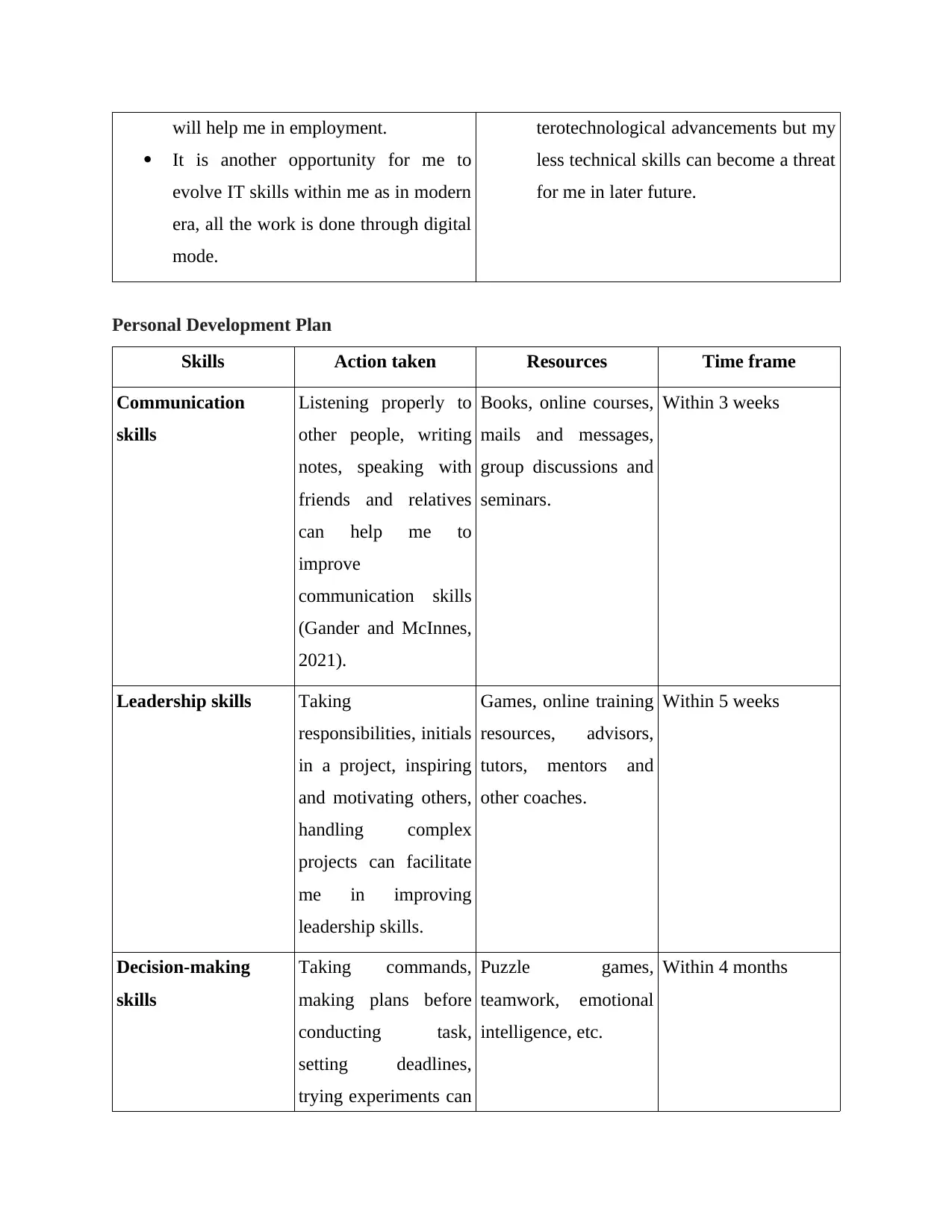
will help me in employment.
It is another opportunity for me to
evolve IT skills within me as in modern
era, all the work is done through digital
mode.
terotechnological advancements but my
less technical skills can become a threat
for me in later future.
Personal Development Plan
Skills Action taken Resources Time frame
Communication
skills
Listening properly to
other people, writing
notes, speaking with
friends and relatives
can help me to
improve
communication skills
(Gander and McInnes,
2021).
Books, online courses,
mails and messages,
group discussions and
seminars.
Within 3 weeks
Leadership skills Taking
responsibilities, initials
in a project, inspiring
and motivating others,
handling complex
projects can facilitate
me in improving
leadership skills.
Games, online training
resources, advisors,
tutors, mentors and
other coaches.
Within 5 weeks
Decision-making
skills
Taking commands,
making plans before
conducting task,
setting deadlines,
trying experiments can
Puzzle games,
teamwork, emotional
intelligence, etc.
Within 4 months
It is another opportunity for me to
evolve IT skills within me as in modern
era, all the work is done through digital
mode.
terotechnological advancements but my
less technical skills can become a threat
for me in later future.
Personal Development Plan
Skills Action taken Resources Time frame
Communication
skills
Listening properly to
other people, writing
notes, speaking with
friends and relatives
can help me to
improve
communication skills
(Gander and McInnes,
2021).
Books, online courses,
mails and messages,
group discussions and
seminars.
Within 3 weeks
Leadership skills Taking
responsibilities, initials
in a project, inspiring
and motivating others,
handling complex
projects can facilitate
me in improving
leadership skills.
Games, online training
resources, advisors,
tutors, mentors and
other coaches.
Within 5 weeks
Decision-making
skills
Taking commands,
making plans before
conducting task,
setting deadlines,
trying experiments can
Puzzle games,
teamwork, emotional
intelligence, etc.
Within 4 months
Paraphrase This Document
Need a fresh take? Get an instant paraphrase of this document with our AI Paraphraser
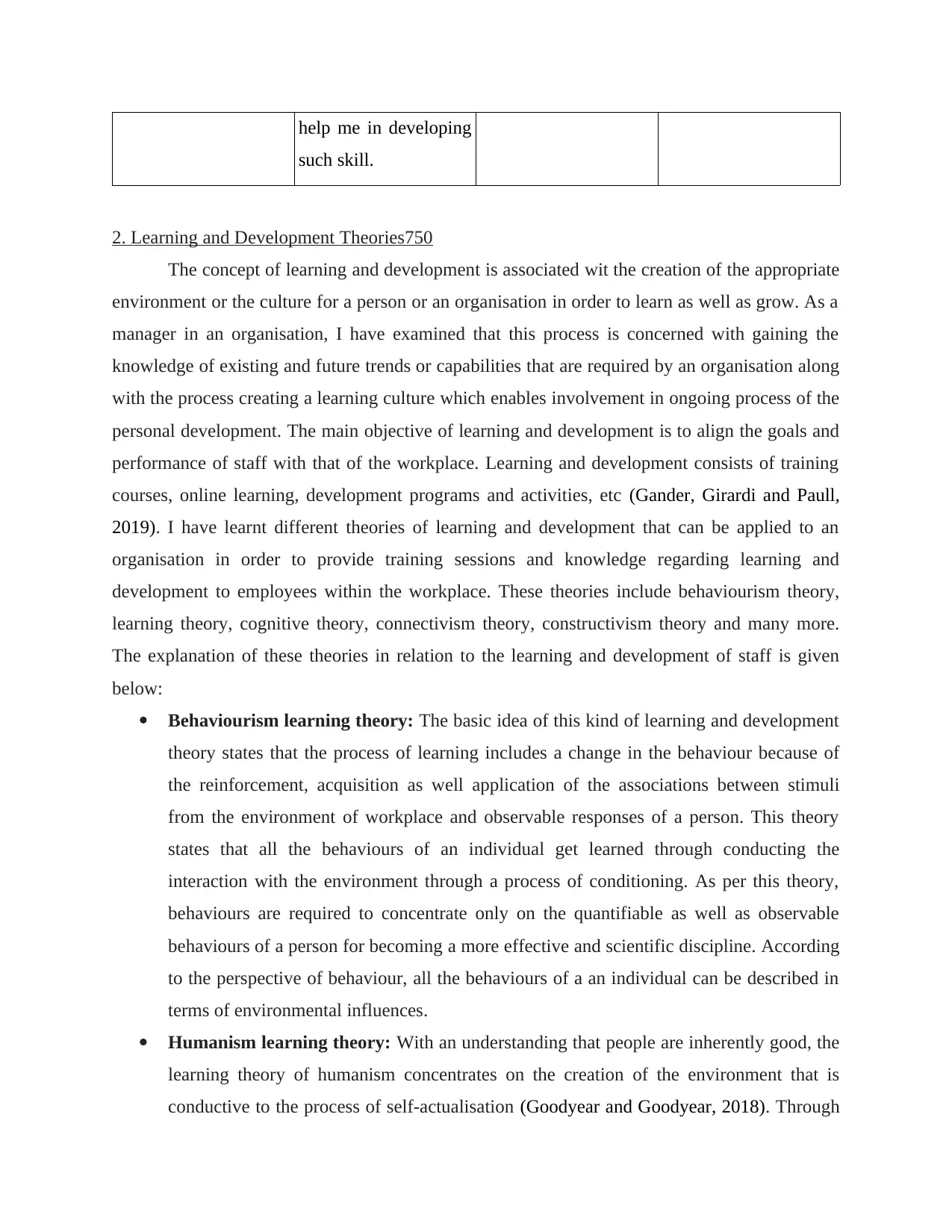
help me in developing
such skill.
2. Learning and Development Theories750
The concept of learning and development is associated wit the creation of the appropriate
environment or the culture for a person or an organisation in order to learn as well as grow. As a
manager in an organisation, I have examined that this process is concerned with gaining the
knowledge of existing and future trends or capabilities that are required by an organisation along
with the process creating a learning culture which enables involvement in ongoing process of the
personal development. The main objective of learning and development is to align the goals and
performance of staff with that of the workplace. Learning and development consists of training
courses, online learning, development programs and activities, etc (Gander, Girardi and Paull,
2019). I have learnt different theories of learning and development that can be applied to an
organisation in order to provide training sessions and knowledge regarding learning and
development to employees within the workplace. These theories include behaviourism theory,
learning theory, cognitive theory, connectivism theory, constructivism theory and many more.
The explanation of these theories in relation to the learning and development of staff is given
below:
Behaviourism learning theory: The basic idea of this kind of learning and development
theory states that the process of learning includes a change in the behaviour because of
the reinforcement, acquisition as well application of the associations between stimuli
from the environment of workplace and observable responses of a person. This theory
states that all the behaviours of an individual get learned through conducting the
interaction with the environment through a process of conditioning. As per this theory,
behaviours are required to concentrate only on the quantifiable as well as observable
behaviours of a person for becoming a more effective and scientific discipline. According
to the perspective of behaviour, all the behaviours of a an individual can be described in
terms of environmental influences.
Humanism learning theory: With an understanding that people are inherently good, the
learning theory of humanism concentrates on the creation of the environment that is
conductive to the process of self-actualisation (Goodyear and Goodyear, 2018). Through
such skill.
2. Learning and Development Theories750
The concept of learning and development is associated wit the creation of the appropriate
environment or the culture for a person or an organisation in order to learn as well as grow. As a
manager in an organisation, I have examined that this process is concerned with gaining the
knowledge of existing and future trends or capabilities that are required by an organisation along
with the process creating a learning culture which enables involvement in ongoing process of the
personal development. The main objective of learning and development is to align the goals and
performance of staff with that of the workplace. Learning and development consists of training
courses, online learning, development programs and activities, etc (Gander, Girardi and Paull,
2019). I have learnt different theories of learning and development that can be applied to an
organisation in order to provide training sessions and knowledge regarding learning and
development to employees within the workplace. These theories include behaviourism theory,
learning theory, cognitive theory, connectivism theory, constructivism theory and many more.
The explanation of these theories in relation to the learning and development of staff is given
below:
Behaviourism learning theory: The basic idea of this kind of learning and development
theory states that the process of learning includes a change in the behaviour because of
the reinforcement, acquisition as well application of the associations between stimuli
from the environment of workplace and observable responses of a person. This theory
states that all the behaviours of an individual get learned through conducting the
interaction with the environment through a process of conditioning. As per this theory,
behaviours are required to concentrate only on the quantifiable as well as observable
behaviours of a person for becoming a more effective and scientific discipline. According
to the perspective of behaviour, all the behaviours of a an individual can be described in
terms of environmental influences.
Humanism learning theory: With an understanding that people are inherently good, the
learning theory of humanism concentrates on the creation of the environment that is
conductive to the process of self-actualisation (Goodyear and Goodyear, 2018). Through
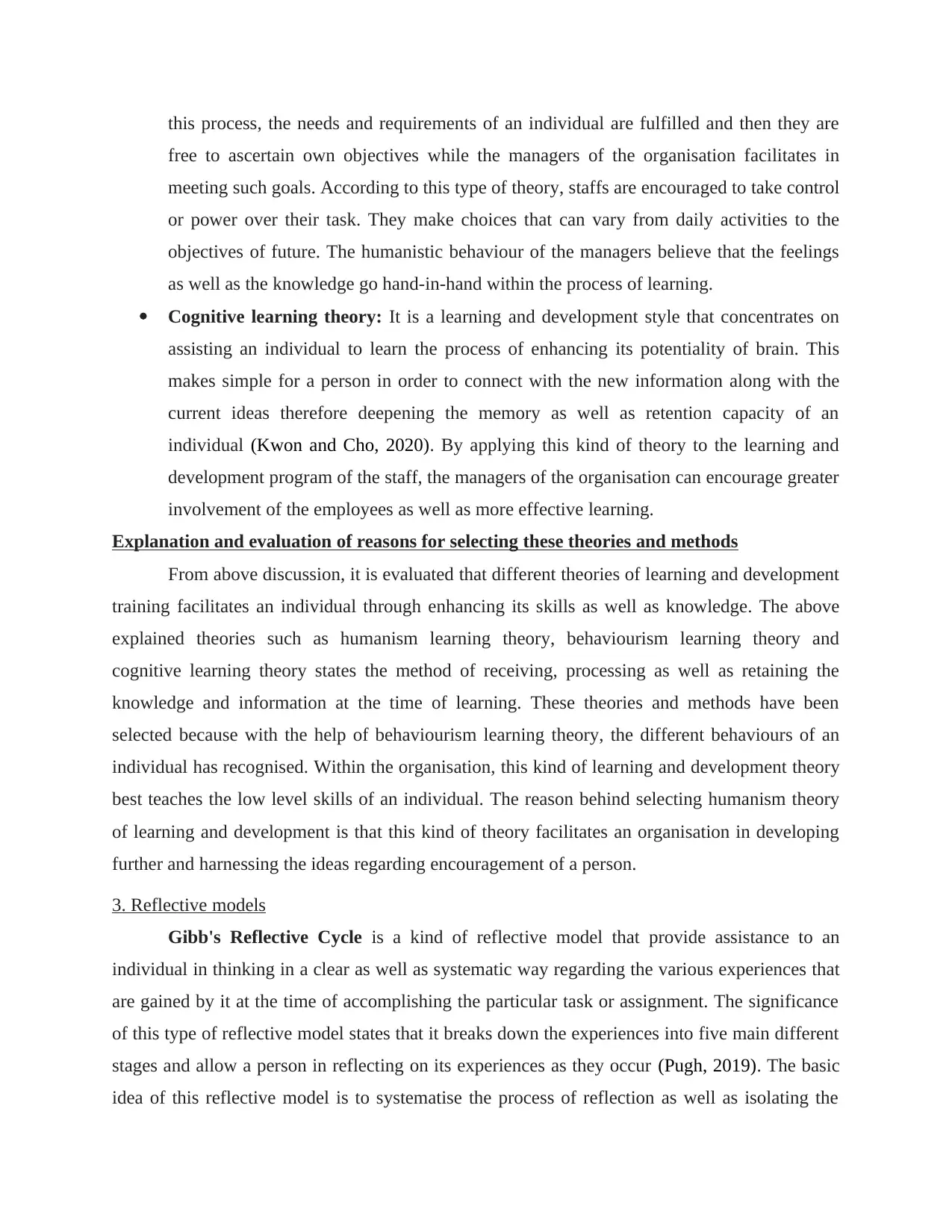
this process, the needs and requirements of an individual are fulfilled and then they are
free to ascertain own objectives while the managers of the organisation facilitates in
meeting such goals. According to this type of theory, staffs are encouraged to take control
or power over their task. They make choices that can vary from daily activities to the
objectives of future. The humanistic behaviour of the managers believe that the feelings
as well as the knowledge go hand-in-hand within the process of learning.
Cognitive learning theory: It is a learning and development style that concentrates on
assisting an individual to learn the process of enhancing its potentiality of brain. This
makes simple for a person in order to connect with the new information along with the
current ideas therefore deepening the memory as well as retention capacity of an
individual (Kwon and Cho, 2020). By applying this kind of theory to the learning and
development program of the staff, the managers of the organisation can encourage greater
involvement of the employees as well as more effective learning.
Explanation and evaluation of reasons for selecting these theories and methods
From above discussion, it is evaluated that different theories of learning and development
training facilitates an individual through enhancing its skills as well as knowledge. The above
explained theories such as humanism learning theory, behaviourism learning theory and
cognitive learning theory states the method of receiving, processing as well as retaining the
knowledge and information at the time of learning. These theories and methods have been
selected because with the help of behaviourism learning theory, the different behaviours of an
individual has recognised. Within the organisation, this kind of learning and development theory
best teaches the low level skills of an individual. The reason behind selecting humanism theory
of learning and development is that this kind of theory facilitates an organisation in developing
further and harnessing the ideas regarding encouragement of a person.
3. Reflective models
Gibb's Reflective Cycle is a kind of reflective model that provide assistance to an
individual in thinking in a clear as well as systematic way regarding the various experiences that
are gained by it at the time of accomplishing the particular task or assignment. The significance
of this type of reflective model states that it breaks down the experiences into five main different
stages and allow a person in reflecting on its experiences as they occur (Pugh, 2019). The basic
idea of this reflective model is to systematise the process of reflection as well as isolating the
free to ascertain own objectives while the managers of the organisation facilitates in
meeting such goals. According to this type of theory, staffs are encouraged to take control
or power over their task. They make choices that can vary from daily activities to the
objectives of future. The humanistic behaviour of the managers believe that the feelings
as well as the knowledge go hand-in-hand within the process of learning.
Cognitive learning theory: It is a learning and development style that concentrates on
assisting an individual to learn the process of enhancing its potentiality of brain. This
makes simple for a person in order to connect with the new information along with the
current ideas therefore deepening the memory as well as retention capacity of an
individual (Kwon and Cho, 2020). By applying this kind of theory to the learning and
development program of the staff, the managers of the organisation can encourage greater
involvement of the employees as well as more effective learning.
Explanation and evaluation of reasons for selecting these theories and methods
From above discussion, it is evaluated that different theories of learning and development
training facilitates an individual through enhancing its skills as well as knowledge. The above
explained theories such as humanism learning theory, behaviourism learning theory and
cognitive learning theory states the method of receiving, processing as well as retaining the
knowledge and information at the time of learning. These theories and methods have been
selected because with the help of behaviourism learning theory, the different behaviours of an
individual has recognised. Within the organisation, this kind of learning and development theory
best teaches the low level skills of an individual. The reason behind selecting humanism theory
of learning and development is that this kind of theory facilitates an organisation in developing
further and harnessing the ideas regarding encouragement of a person.
3. Reflective models
Gibb's Reflective Cycle is a kind of reflective model that provide assistance to an
individual in thinking in a clear as well as systematic way regarding the various experiences that
are gained by it at the time of accomplishing the particular task or assignment. The significance
of this type of reflective model states that it breaks down the experiences into five main different
stages and allow a person in reflecting on its experiences as they occur (Pugh, 2019). The basic
idea of this reflective model is to systematise the process of reflection as well as isolating the
⊘ This is a preview!⊘
Do you want full access?
Subscribe today to unlock all pages.

Trusted by 1+ million students worldwide
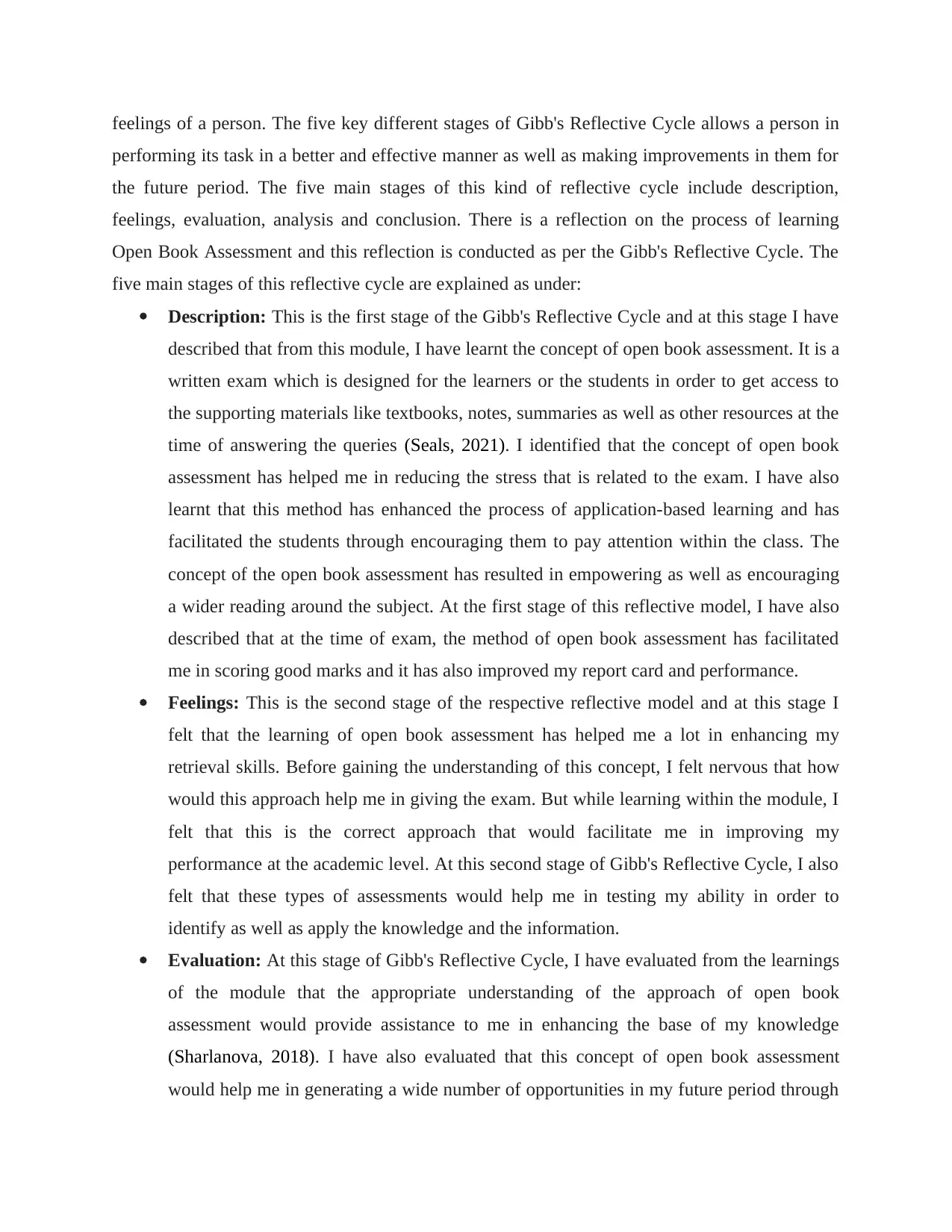
feelings of a person. The five key different stages of Gibb's Reflective Cycle allows a person in
performing its task in a better and effective manner as well as making improvements in them for
the future period. The five main stages of this kind of reflective cycle include description,
feelings, evaluation, analysis and conclusion. There is a reflection on the process of learning
Open Book Assessment and this reflection is conducted as per the Gibb's Reflective Cycle. The
five main stages of this reflective cycle are explained as under:
Description: This is the first stage of the Gibb's Reflective Cycle and at this stage I have
described that from this module, I have learnt the concept of open book assessment. It is a
written exam which is designed for the learners or the students in order to get access to
the supporting materials like textbooks, notes, summaries as well as other resources at the
time of answering the queries (Seals, 2021). I identified that the concept of open book
assessment has helped me in reducing the stress that is related to the exam. I have also
learnt that this method has enhanced the process of application-based learning and has
facilitated the students through encouraging them to pay attention within the class. The
concept of the open book assessment has resulted in empowering as well as encouraging
a wider reading around the subject. At the first stage of this reflective model, I have also
described that at the time of exam, the method of open book assessment has facilitated
me in scoring good marks and it has also improved my report card and performance.
Feelings: This is the second stage of the respective reflective model and at this stage I
felt that the learning of open book assessment has helped me a lot in enhancing my
retrieval skills. Before gaining the understanding of this concept, I felt nervous that how
would this approach help me in giving the exam. But while learning within the module, I
felt that this is the correct approach that would facilitate me in improving my
performance at the academic level. At this second stage of Gibb's Reflective Cycle, I also
felt that these types of assessments would help me in testing my ability in order to
identify as well as apply the knowledge and the information.
Evaluation: At this stage of Gibb's Reflective Cycle, I have evaluated from the learnings
of the module that the appropriate understanding of the approach of open book
assessment would provide assistance to me in enhancing the base of my knowledge
(Sharlanova, 2018). I have also evaluated that this concept of open book assessment
would help me in generating a wide number of opportunities in my future period through
performing its task in a better and effective manner as well as making improvements in them for
the future period. The five main stages of this kind of reflective cycle include description,
feelings, evaluation, analysis and conclusion. There is a reflection on the process of learning
Open Book Assessment and this reflection is conducted as per the Gibb's Reflective Cycle. The
five main stages of this reflective cycle are explained as under:
Description: This is the first stage of the Gibb's Reflective Cycle and at this stage I have
described that from this module, I have learnt the concept of open book assessment. It is a
written exam which is designed for the learners or the students in order to get access to
the supporting materials like textbooks, notes, summaries as well as other resources at the
time of answering the queries (Seals, 2021). I identified that the concept of open book
assessment has helped me in reducing the stress that is related to the exam. I have also
learnt that this method has enhanced the process of application-based learning and has
facilitated the students through encouraging them to pay attention within the class. The
concept of the open book assessment has resulted in empowering as well as encouraging
a wider reading around the subject. At the first stage of this reflective model, I have also
described that at the time of exam, the method of open book assessment has facilitated
me in scoring good marks and it has also improved my report card and performance.
Feelings: This is the second stage of the respective reflective model and at this stage I
felt that the learning of open book assessment has helped me a lot in enhancing my
retrieval skills. Before gaining the understanding of this concept, I felt nervous that how
would this approach help me in giving the exam. But while learning within the module, I
felt that this is the correct approach that would facilitate me in improving my
performance at the academic level. At this second stage of Gibb's Reflective Cycle, I also
felt that these types of assessments would help me in testing my ability in order to
identify as well as apply the knowledge and the information.
Evaluation: At this stage of Gibb's Reflective Cycle, I have evaluated from the learnings
of the module that the appropriate understanding of the approach of open book
assessment would provide assistance to me in enhancing the base of my knowledge
(Sharlanova, 2018). I have also evaluated that this concept of open book assessment
would help me in generating a wide number of opportunities in my future period through
Paraphrase This Document
Need a fresh take? Get an instant paraphrase of this document with our AI Paraphraser
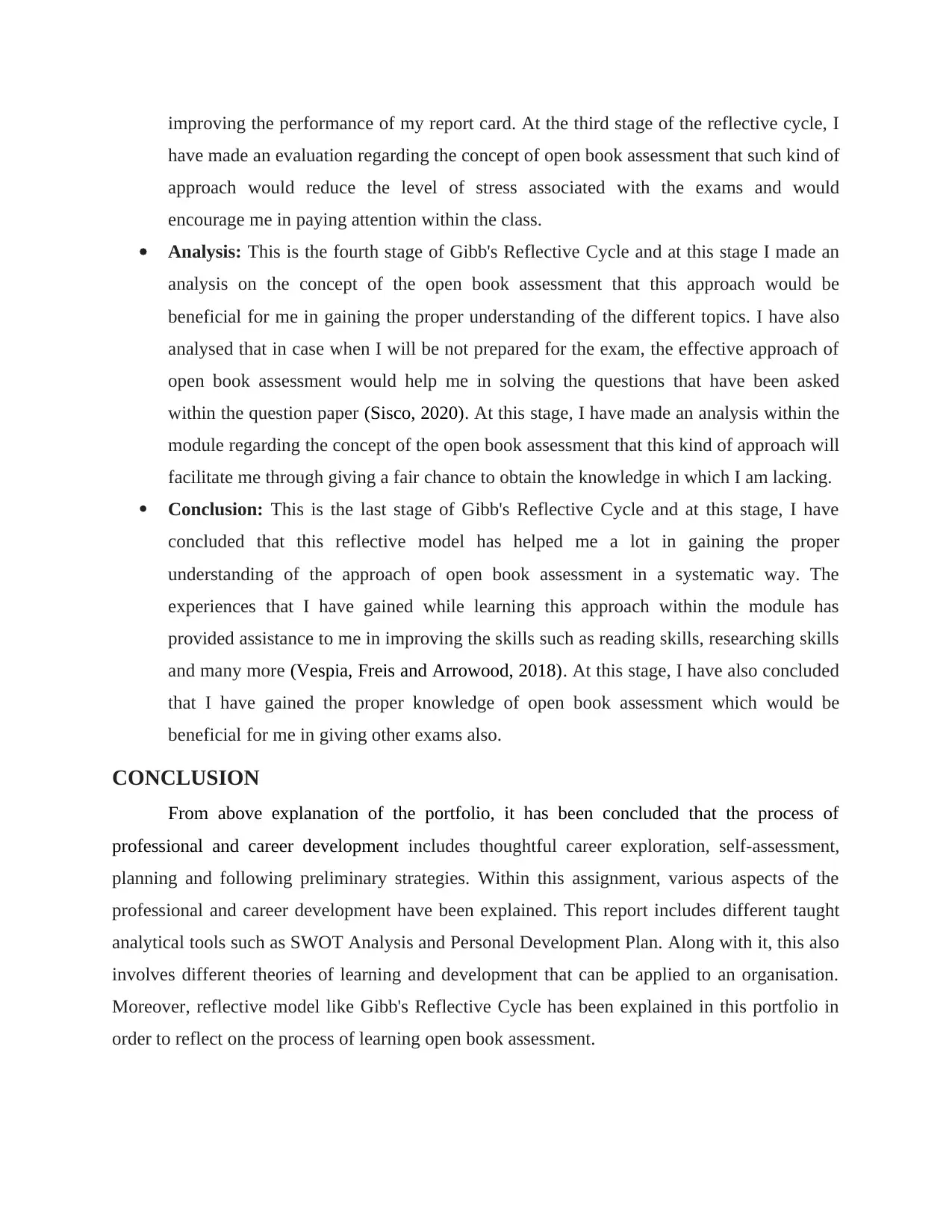
improving the performance of my report card. At the third stage of the reflective cycle, I
have made an evaluation regarding the concept of open book assessment that such kind of
approach would reduce the level of stress associated with the exams and would
encourage me in paying attention within the class.
Analysis: This is the fourth stage of Gibb's Reflective Cycle and at this stage I made an
analysis on the concept of the open book assessment that this approach would be
beneficial for me in gaining the proper understanding of the different topics. I have also
analysed that in case when I will be not prepared for the exam, the effective approach of
open book assessment would help me in solving the questions that have been asked
within the question paper (Sisco, 2020). At this stage, I have made an analysis within the
module regarding the concept of the open book assessment that this kind of approach will
facilitate me through giving a fair chance to obtain the knowledge in which I am lacking.
Conclusion: This is the last stage of Gibb's Reflective Cycle and at this stage, I have
concluded that this reflective model has helped me a lot in gaining the proper
understanding of the approach of open book assessment in a systematic way. The
experiences that I have gained while learning this approach within the module has
provided assistance to me in improving the skills such as reading skills, researching skills
and many more (Vespia, Freis and Arrowood, 2018). At this stage, I have also concluded
that I have gained the proper knowledge of open book assessment which would be
beneficial for me in giving other exams also.
CONCLUSION
From above explanation of the portfolio, it has been concluded that the process of
professional and career development includes thoughtful career exploration, self-assessment,
planning and following preliminary strategies. Within this assignment, various aspects of the
professional and career development have been explained. This report includes different taught
analytical tools such as SWOT Analysis and Personal Development Plan. Along with it, this also
involves different theories of learning and development that can be applied to an organisation.
Moreover, reflective model like Gibb's Reflective Cycle has been explained in this portfolio in
order to reflect on the process of learning open book assessment.
have made an evaluation regarding the concept of open book assessment that such kind of
approach would reduce the level of stress associated with the exams and would
encourage me in paying attention within the class.
Analysis: This is the fourth stage of Gibb's Reflective Cycle and at this stage I made an
analysis on the concept of the open book assessment that this approach would be
beneficial for me in gaining the proper understanding of the different topics. I have also
analysed that in case when I will be not prepared for the exam, the effective approach of
open book assessment would help me in solving the questions that have been asked
within the question paper (Sisco, 2020). At this stage, I have made an analysis within the
module regarding the concept of the open book assessment that this kind of approach will
facilitate me through giving a fair chance to obtain the knowledge in which I am lacking.
Conclusion: This is the last stage of Gibb's Reflective Cycle and at this stage, I have
concluded that this reflective model has helped me a lot in gaining the proper
understanding of the approach of open book assessment in a systematic way. The
experiences that I have gained while learning this approach within the module has
provided assistance to me in improving the skills such as reading skills, researching skills
and many more (Vespia, Freis and Arrowood, 2018). At this stage, I have also concluded
that I have gained the proper knowledge of open book assessment which would be
beneficial for me in giving other exams also.
CONCLUSION
From above explanation of the portfolio, it has been concluded that the process of
professional and career development includes thoughtful career exploration, self-assessment,
planning and following preliminary strategies. Within this assignment, various aspects of the
professional and career development have been explained. This report includes different taught
analytical tools such as SWOT Analysis and Personal Development Plan. Along with it, this also
involves different theories of learning and development that can be applied to an organisation.
Moreover, reflective model like Gibb's Reflective Cycle has been explained in this portfolio in
order to reflect on the process of learning open book assessment.
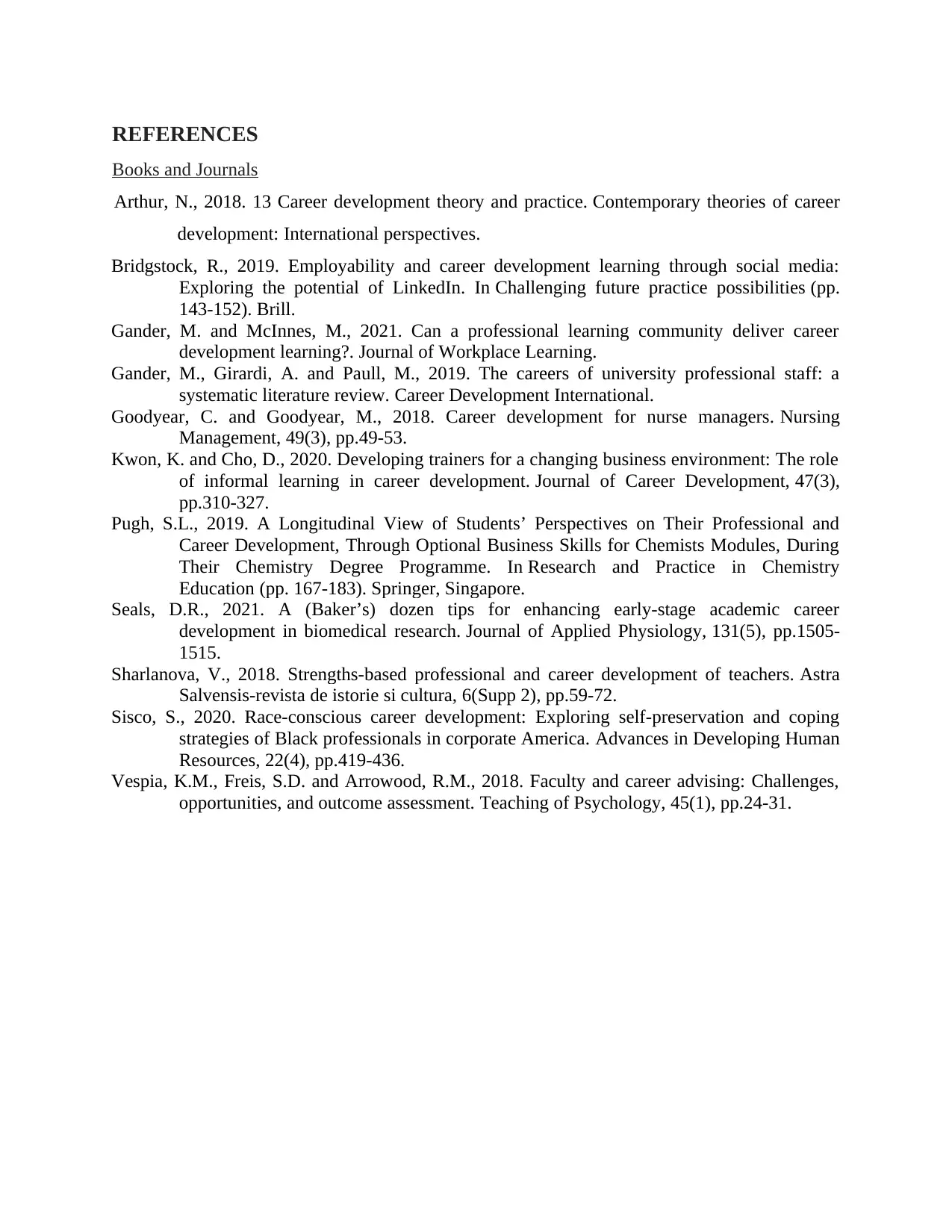
REFERENCES
Books and Journals
Arthur, N., 2018. 13 Career development theory and practice. Contemporary theories of career
development: International perspectives.
Bridgstock, R., 2019. Employability and career development learning through social media:
Exploring the potential of LinkedIn. In Challenging future practice possibilities (pp.
143-152). Brill.
Gander, M. and McInnes, M., 2021. Can a professional learning community deliver career
development learning?. Journal of Workplace Learning.
Gander, M., Girardi, A. and Paull, M., 2019. The careers of university professional staff: a
systematic literature review. Career Development International.
Goodyear, C. and Goodyear, M., 2018. Career development for nurse managers. Nursing
Management, 49(3), pp.49-53.
Kwon, K. and Cho, D., 2020. Developing trainers for a changing business environment: The role
of informal learning in career development. Journal of Career Development, 47(3),
pp.310-327.
Pugh, S.L., 2019. A Longitudinal View of Students’ Perspectives on Their Professional and
Career Development, Through Optional Business Skills for Chemists Modules, During
Their Chemistry Degree Programme. In Research and Practice in Chemistry
Education (pp. 167-183). Springer, Singapore.
Seals, D.R., 2021. A (Baker’s) dozen tips for enhancing early-stage academic career
development in biomedical research. Journal of Applied Physiology, 131(5), pp.1505-
1515.
Sharlanova, V., 2018. Strengths-based professional and career development of teachers. Astra
Salvensis-revista de istorie si cultura, 6(Supp 2), pp.59-72.
Sisco, S., 2020. Race-conscious career development: Exploring self-preservation and coping
strategies of Black professionals in corporate America. Advances in Developing Human
Resources, 22(4), pp.419-436.
Vespia, K.M., Freis, S.D. and Arrowood, R.M., 2018. Faculty and career advising: Challenges,
opportunities, and outcome assessment. Teaching of Psychology, 45(1), pp.24-31.
Books and Journals
Arthur, N., 2018. 13 Career development theory and practice. Contemporary theories of career
development: International perspectives.
Bridgstock, R., 2019. Employability and career development learning through social media:
Exploring the potential of LinkedIn. In Challenging future practice possibilities (pp.
143-152). Brill.
Gander, M. and McInnes, M., 2021. Can a professional learning community deliver career
development learning?. Journal of Workplace Learning.
Gander, M., Girardi, A. and Paull, M., 2019. The careers of university professional staff: a
systematic literature review. Career Development International.
Goodyear, C. and Goodyear, M., 2018. Career development for nurse managers. Nursing
Management, 49(3), pp.49-53.
Kwon, K. and Cho, D., 2020. Developing trainers for a changing business environment: The role
of informal learning in career development. Journal of Career Development, 47(3),
pp.310-327.
Pugh, S.L., 2019. A Longitudinal View of Students’ Perspectives on Their Professional and
Career Development, Through Optional Business Skills for Chemists Modules, During
Their Chemistry Degree Programme. In Research and Practice in Chemistry
Education (pp. 167-183). Springer, Singapore.
Seals, D.R., 2021. A (Baker’s) dozen tips for enhancing early-stage academic career
development in biomedical research. Journal of Applied Physiology, 131(5), pp.1505-
1515.
Sharlanova, V., 2018. Strengths-based professional and career development of teachers. Astra
Salvensis-revista de istorie si cultura, 6(Supp 2), pp.59-72.
Sisco, S., 2020. Race-conscious career development: Exploring self-preservation and coping
strategies of Black professionals in corporate America. Advances in Developing Human
Resources, 22(4), pp.419-436.
Vespia, K.M., Freis, S.D. and Arrowood, R.M., 2018. Faculty and career advising: Challenges,
opportunities, and outcome assessment. Teaching of Psychology, 45(1), pp.24-31.
⊘ This is a preview!⊘
Do you want full access?
Subscribe today to unlock all pages.

Trusted by 1+ million students worldwide
1 out of 9
Related Documents
Your All-in-One AI-Powered Toolkit for Academic Success.
+13062052269
info@desklib.com
Available 24*7 on WhatsApp / Email
![[object Object]](/_next/static/media/star-bottom.7253800d.svg)
Unlock your academic potential
Copyright © 2020–2026 A2Z Services. All Rights Reserved. Developed and managed by ZUCOL.



